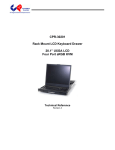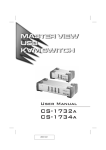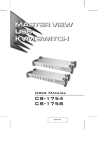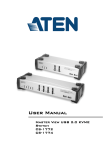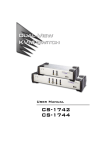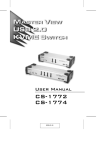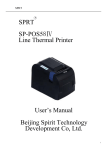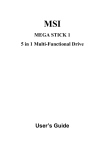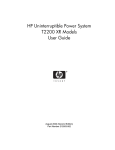Download Equip Desktop KVM Switch User guide
Transcript
HP 1x4 USB/PS2 KVM Switch User Guide July 2004 (First Edition) Part Number 372284-001 © Copyright 2004 Hewlett-Packard Development Company, L.P. The information contained herein is subject to change without notice. The only warranties for HP products and services are set forth in the express warranty statements accompanying such products and services. Nothing herein should be construed as constituting an additional warranty. HP shall not be liable for technical or editorial errors or omissions contained herein. Microsoft and Windows are U.S. registered trademarks of Microsoft Corporation. Linux is a U.S. registered trademark of Linus Torvalds. HP 1x4 USB/PS2 KVM Switch User Guide July 2004 (First Edition) Part Number 372284-001 Contents About This Guide Intended Audience...................................................................................................................................... vii Important Safety Information ..................................................................................................................... vii Symbols on Equipment .............................................................................................................................. vii Rack Stability ............................................................................................................................................ viii Symbols in Text......................................................................................................................................... viii Text Conventions ...................................................................................................................................... viii Getting Help .................................................................................................................................................ix HP Technical Support ............................................................................................................................ix HP Website ............................................................................................................................................ix HP Authorized Reseller .........................................................................................................................ix Reader’s Comments .....................................................................................................................................ix Chapter 1 Introduction Overview ................................................................................................................................................... 1-1 Features ..................................................................................................................................................... 1-1 Hardware Requirements ............................................................................................................................ 1-2 Front Panel ................................................................................................................................................ 1-3 Rear Panel.................................................................................................................................................. 1-4 Chapter 2 Installation Desktop Model Hardware Installation....................................................................................................... 2-1 Rackmount Model Hardware Installation ................................................................................................. 2-4 Performing a Side-Mount Installation ................................................................................................ 2-5 Performing a Cantilever Installation ................................................................................................... 2-6 Cabling the Switch.............................................................................................................................. 2-7 Chapter 3 Operation Hot Plugging.............................................................................................................................................. 3-1 Powering Off and Restarting ..................................................................................................................... 3-1 Port Numbering ......................................................................................................................................... 3-1 Hotkey Operation ...................................................................................................................................... 3-1 Port Switching..................................................................................................................................... 3-2 Auto Scanning..................................................................................................................................... 3-3 HP 1x4 USB/PS2 KVM Switch User Guide iii Contents Hotkey Setting Mode .................................................................................................................................3-3 Invoking HSM.....................................................................................................................................3-3 Alternate HSM Invocation Keys .........................................................................................................3-4 Alternate Port Switching Keys ............................................................................................................3-4 Keyboard Operating Platform .............................................................................................................3-4 Listing Hotkey Settings .......................................................................................................................3-5 USB Reset ...........................................................................................................................................3-5 Hotkey Beeper Control........................................................................................................................3-5 Disabling Port Switching Keys ...........................................................................................................3-5 Restoring Default Settings...................................................................................................................3-5 HSM Summary Table..........................................................................................................................3-6 Keyboard Emulation ..................................................................................................................................3-6 Sun Keyboard ......................................................................................................................................3-6 Macintosh Keyboard ...........................................................................................................................3-7 Chapter 4 Firmware Upgrade Utility Before You Begin ......................................................................................................................................4-1 Starting the Upgrade ..................................................................................................................................4-3 Chapter 5 Troubleshooting Appendix A Regulatory Compliance Notices Regulatory Model Number ....................................................................................................................... A-1 Federal Communications Commission Notice ......................................................................................... A-1 Class A Equipment............................................................................................................................. A-1 Class B Equipment ............................................................................................................................. A-2 Declaration of Conformity for Products Marked with the FCC Logo, United States Only ............... A-2 Modifications...................................................................................................................................... A-2 Cables ................................................................................................................................................. A-3 Canadian Notice (Avis Canadien)............................................................................................................. A-3 Class A Equipment............................................................................................................................. A-3 Class B Equipment ............................................................................................................................. A-3 European Union Regulatory Notice.......................................................................................................... A-3 Japanese Notice......................................................................................................................................... A-5 Power Cord Statement for Japan ........................................................................................................ A-5 Korean Notice ........................................................................................................................................... A-5 Class A Equipment............................................................................................................................. A-5 Class B Equipment ............................................................................................................................. A-6 BSMI Notice ............................................................................................................................................. A-6 Appendix B Electrostatic Discharge Preventing Electrostatic Damage .............................................................................................................. B-1 Grounding Methods .................................................................................................................................. B-2 iv HP 1x4 USB/PS2 KVM Switch User Guide Contents Appendix C Specifications Index HP 1x4 USB/PS2 KVM Switch User Guide v About This Guide This guide provides information for installation and operation of the switch. Intended Audience This guide is intended for individuals requiring information about the use of switches. Important Safety Information Before installing this product, read the Important Safety Information document provided. Symbols on Equipment The following symbols may be placed on equipment to indicate the presence of potentially hazardous conditions. WARNING: This symbol, in conjunction with any of the following symbols, indicates the presence of a potential hazard. The potential for injury exists if warnings are not observed. Consult your documentation for specific details. This symbol indicates the presence of hazardous energy circuits or electric shock hazards. Refer all servicing to qualified personnel. WARNING: To prevent injury from electric shock hazards, do not open this enclosure. Refer all maintenance, upgrades, and servicing to qualified personnel. This symbol indicates that the component exceeds the recommended weight for one individual to handle safely. Weight in kg Weight in lb WARNING: To prevent personal injury or damage to the equipment, observe local occupational health and safety requirements and guidelines for manual material handling. HP 1x4 USB/PS2 KVM Switch User Guide vii About This Guide Rack Stability WARNING: To prevent personal injury or damage to the equipment, verify that: • The leveling feet are extended to the floor. • The full weight of the rack rests on the leveling feet. • The stabilizing feet are attached to the rack if it is a single-rack installation. • The racks are coupled together if it is a multiple-rack installation. • Only one component is extended at a time. A rack may become unstable if more than one component is extended for any reason. Symbols in Text These symbols can be found in the text of this guide. They have the following meanings. WARNING: Text set off in this manner indicates that failure to follow directions in the warning could result in bodily harm or loss of life. CAUTION: Text set off in this manner indicates that failure to follow directions could result in damage to equipment or loss of information. IMPORTANT: Text set off in this manner presents clarifying information or specific instructions. NOTE: Text set off in this manner presents commentary, sidelights, or interesting points of information. Text Conventions This document uses the following conventions: viii • Italic type is used for complete titles of published guides or variables. Variables include information that varies in system output, in command lines, and in command parameters in text. • Bold type is used for emphasis, for onscreen interface components (window titles, menu names and selections, button and icon names, and so on), and for keyboard keys. • Monospace typeface is used for command lines, code examples, screen displays, error messages, and user input. • Sans serif typeface is used for uniform resource locators (URLs). HP 1x4 USB/PS2 KVM Switch User Guide About This Guide Getting Help If you have a problem and have exhausted the information in this guide, further information and other help is available in the following locations. HP Technical Support For telephone numbers of worldwide Technical Support Centers, go to http://www.hp.com. Have the following information available before you call: • Technical support registration number (if applicable) • Product serial number • Product model name and number • Applicable error messages • Add-on boards or hardware • Third-party hardware or software • Operating system type and revision level • Power management software type and version HP Website For information on this product as well as the latest drivers, firmware, and service packs, go to http://h18004.www1.hp.com/products/servers/proliantstorage/rackoptions/list.html#console. HP Authorized Reseller For the name of your nearest HP authorized reseller: • In the United States, call 1-800-345-1518. • In Canada, call 1-800-263-5868. • Elsewhere, refer to the HP website for locations and telephone numbers. Reader’s Comments To comment on this guide, send an email to [email protected]. HP 1x4 USB/PS2 KVM Switch User Guide ix 1 Introduction Overview The HP 1x4 USB/PS2 KVM Switch is a four-port keyboard, video, and mouse (KVM) switch combined with a two-port USB hub. As a KVM switch, four computers can be accessed from a single keyboard, mouse, and monitor console. Keyboard and mouse data can be transferred to the computers using a USB connection, or with the traditional PS/2 connection. If a USB connection is used, the two-port USB hub is available to each of the computers, allowing each computer to access any peripherals connected to the hub on a one-computer-at-a-time basis. Features • Dual-function KVM/USB switch • Ability to control four computers and two additional USB devices with one console NOTE: Both USB peripheral ports on the switch rear panel will not function unless USB KVM cables are used. Cable sets with USB connectors are available for order from the HP website at http://h18004.www1.hp.com/products/servers/proliantstorage/rack-options/list.html#console. • Dual-interface support—PS/2 or USB keyboard and mouse data transport for PC compatible computers NOTE: Macintosh and Sun computers must use the USB cable connection. Cable sets with USB connectors are available for order from the HP website at http://h18004.www1.hp.com/products/servers/proliantstorage/rack-options/list.html#console. • Independent (asynchronous) switching of KVM and peripheral USB ports • Fully compliant with the USB 1.1 specification; supports transfer rates of 1.5 to 12 Mb/s • Computer selection available using front panel switches or hotkeys • LED display for easy status monitoring • Auto Scan mode for monitoring all computers • Complete keyboard emulation for error-free booting • Superior video quality: 2048 x 1536; bi-directional data display channel (DDC2B) • Switch refresh rate of 60 Hz HP 1x4 USB/PS2 KVM Switch User Guide 1-1 Introduction • Easy installation; no software required • Hot pluggable—Add or remove computers for maintenance without powering down the switch • Microsoft® Windows® 98SE/ME, Windows 2000, Windows XP, Mac OS 8.6 or higher, Solaris, and Linux host systems supported Hardware Requirements The console requires: • A VGA, SVGA, or Multisync monitor capable of the highest resolution that will be used on any computer in the installation • A USB style mouse or a PS/2 style mouse with the included PS/2-to-USB interface adapter • A USB style keyboard or a PS/2 style keyboard with the included PS/2-to-USB interface adapter Each computer requires: • A VGA, SVGA, or Multisync card • PS/2 keyboard and mouse ports Only custom cable sets specifically designed to work with the switch can be used to link to the computers. Two PS/2 cables with audio connectors (Desktop model) or four PS/2 cables without audio connectors (Rackmount model) are provided with the switch. The switch also supports computers that use USB connectors to transfer keyboard and mouse data. Cable sets with USB connectors are available for order from the HP website at http://h18004.www1.hp.com/products/servers/proliantstorage/rack-options/list.html#console. NOTE: The switch USB hub function only works with USB cable set connections. It will not work with PS/2 cable set connections. 1-2 HP 1x4 USB/PS2 KVM Switch User Guide Introduction Front Panel Figure 1-1: Front panel Item 1 2 Description Function Port selection switches • Press a switch for longer than 2 seconds to bring the KVM focus, USB peripherals, and audio focus to the computer attached to the corresponding port. • Press a switch for less than 2 seconds to bring only the KVM focus to the computer attached to the corresponding port. • Press switches 1 and 2 simultaneously for 2 seconds to start Auto Scan mode. For more information on Auto Scan mode, refer to “Auto Scanning” in chapter 3 of this guide. • Press switches 3 and 4 simultaneously for 2 seconds to perform a keyboard and mouse reset. Port LEDs The Port LEDs are built into the Port Selection Switches. The upper LEDs are the KVM Port LEDs. The lower LEDs are the USB LEDs. KVM Port LEDs • Dim orange—I ndicates that the computer attached to the corresponding port is currently online • Bright orange—Indicates tha t the computer attached to the corresponding port is selected for the KVM focus • Flashing orange—Indic ates that the computer attached to the corresponding port is being accessed under Auto Scan mode USB LEDs 3 USB console ports HP 1x4 USB/PS2 KVM Switch User Guide • Dim green—In dicates that there is a USB cable connection to the computer • Bright green—I ndicates that the computer attached to the corresponding port has access to the USB peripherals Connectors used for attaching a USB keyboard and mouse or the PS/2-to-USB interface adapter. 1-3 Introduction Rear Panel Figure 1-2: Rear panel Item 1-4 Description Function 1 Console audio jacks Connectors used for attaching the cables for the console microphone and speakers. Each jack is marked with the appropriate icon. 2 USB hub peripheral ports Connectors used for attaching USB peripherals, such as printers and scanners. 3 Firmware upgrade switch During normal operation, the firmware upgrade switch must be in the NORMAL position. 4 Firmware upgrade port The RJ-11 firmware upgrade cable plugs into this connector. For more information on upgrading the firmware, refer to chapter 4 of this guide. 5 Power jack Connector used for attaching the cable for external power. 6 Monitor port Connector used for attaching the video cable for the console monitor. 7 CPU ports Connectors used for attaching the custom cable sets that link the switch to the computers. Each CPU port includes a microphone jack, speaker jack, and KVM data connector. HP 1x4 USB/PS2 KVM Switch User Guide 2 Installation Desktop Model Hardware Installation CAUTION: To prevent damage to the equipment: • Power down all devices before connecting. • Be sure that all devices are properly grounded. 1. Connect the console mouse and keyboard by doing one of the following: — Connect the USB mouse (1) and keyboard (2) to the USB ports on the switch front panel. HP 1x4 USB/PS2 KVM Switch User Guide 2-1 Installation — Connect the PS/2-to-USB interface adapter to the console USB keyboard port on the switch front panel. Connect the PS/2 style mouse and keyboard to the appropriate ports on the adapter. IMPORTANT: If a USB mouse and USB keyboard are connected to the USB keyboard port on the switch front panel, do not use the PS/2-to-USB interface adapter to connect a second keyboard and mouse. Only use the rear panel USB ports to connect USB peripherals. 2. Connect the console speakers (1), microphone (2), and monitor (3) to the appropriate ports on the switch rear panel. 2-2 HP 1x4 USB/PS2 KVM Switch User Guide Installation 3. Plug the CPU connector on the KVM cable (3) into any available KVM socket in the CPU port section on the switch rear panel. Plug the accompanying microphone connector (2) and speaker connector (1) into the corresponding jacks. NOTE: The cables that ship with the Rackmount model do not include audio jacks. 4. Plug the PS/2 mouse connector (1), the PS/2 keyboard connector (2), the microphone connector (3), the speaker connector (4), and the video connector (5) on the KVM cable into their respective ports on the computer. Be sure that each plug corresponds to its intended CPU port socket. NOTE: The cables that ship with the Rackmount model do not include audio jacks. NOTE: The switch also supports computers that use USB connectors to transfer keyboard and mouse data. Cable sets with USB connectors are available for order from the HP website at http://h18004.www1.hp.com/products/servers/proliantstorage/rack-options/list.html#console. HP 1x4 USB/PS2 KVM Switch User Guide 2-3 Installation 5. Connect external power to the power jack on the switch rear panel using the AC adapter that came in your kit. Connect the AC power adapter plug to a grounded utility power source (Desktop models), or connect the appropriate jumper cord between the AC adapter and an uninterruptible power system (UPS) or a power distribution unit (PDU) (Rackmount model). 6. Power up the connected computers. Rackmount Model Hardware Installation CAUTION: To prevent damage to the equipment: 2-4 • Power down all devices before connecting. • Be sure that all devices are properly grounded. HP 1x4 USB/PS2 KVM Switch User Guide Installation Performing a Side-Mount Installation 1. Remove the eight screws, four on each side, from the switch. 2. Attach the 0U brackets to the switch, using the screws you removed. 3. Install two cage nuts into the side-mount bracket U locations, and secure the switch to the rails using two M-6 screws, one on each side. HP 1x4 USB/PS2 KVM Switch User Guide 2-5 Installation Performing a Cantilever Installation 1. Remove the eight screws, four on each side, from the switch. 2. Attach the 1U brackets to the switch, using six of the screws you removed, three on each side. 3. Do one of the following: — Install two clip nuts, one on each side of the rack. 2-6 HP 1x4 USB/PS2 KVM Switch User Guide Installation — Install two cage nuts, one on each side of the rack. 4. Secure the switch to the rails, using the appropriate screws. Cabling the Switch Connect the switch cables as described in “Desktop Model Hardware Installation.” HP 1x4 USB/PS2 KVM Switch User Guide 2-7 3 Operation Hot Plugging The switch supports USB hot plugging. Components can be removed and added back into the installation by unplugging their cables from the CPU ports without the need to shut down the unit. Powering Off and Restarting To power off and restart the switch: 1. Disconnect all of the computers from the switch. 2. Disconnect the external power cable from the switch rear panel. 3. Wait 10 seconds, then plug the external power cable back into the switch rear panel. 4. After the switch is powered up, reconnect the computers. Port Numbering Each CPU port on the switch is assigned a port number. The port numbers are marked on the switch rear panel. The Port ID of a computer is the same as the CPU port number to which it is connected. For example, a computer connected to CPU port 3 has a Port ID of 3. The Port ID is used to specify which computer gets the KVM focus, USB peripherals, and audio focus with the hotkey port selection method. Hotkey Operation The switch provides an extensive, easy-to-use, hotkey function that makes it convenient to control and configure the KVM installation from the console keyboard. Hotkeys provide asynchronous (independent) switching of the KVM focus, USB peripherals, and audio focus. HP 1x4 USB/PS2 KVM Switch User Guide 3-1 Operation Port Switching All port switches begin with pressing the Scroll Lock key twice. Table 3-1 and Table 3-2 describe the actions that each key combination performs. NOTE: If using the Scroll Lock key conflicts with other programs running on the computer, the Ctrl key can be used instead. To use the Ctrl key, refer to “Alternate Port Switching Keys” in this chapter. Table 3-1: Cycling Through Ports Hotkey Scroll Lock Action Enter Switches KVM focus, audio focus, and USB peripherals from the port that currently has the KVM focus to the next port on the installation. The KVM focus, audio focus, and USB peripherals all go to this port even if they were initially on different ports. K Enter Switches KVM focus to the next port on the installation. The USB peripherals and audio focus remain unchanged. U Enter Switches USB peripherals to the next port on the installation. The KVM focus and audio focus remain unchanged. S Enter Switches audio focus to the next port on the installation. The KVM focus and USB peripherals remain unchanged. Scroll Lock Table 3-2: Selecting a Port Hotkey Scroll Lock Action n Enter Switches KVM focus, audio focus, and USB peripherals to port n n K Enter Switches KVM focus to port n n U Enter Switches USB peripherals to port n n S Enter Switches audio focus to port n n K U Enter Switches KVM focus and USB peripherals to port n n K S Enter Switches KVM focus and audio focus to port n n S U Enter Switches audio focus and USB peripherals to port n n K S U Enter Switches KVM focus, audio focus, and USB peripherals to port n Scroll Lock 3-2 HP 1x4 USB/PS2 KVM Switch User Guide Operation Auto Scanning The Auto Scan feature automatically cycles the KVM focus through the computer ports at regular intervals. This feature enables you to monitor the computer activity without having to switch from port to port manually. Table 3-3: Auto Scanning Hotkey Scroll Lock Action A Enter Starts Auto Scan. The KVM focus cycles from port to port at 5-second intervals. A n Enter Starts Auto Scan. The KVM focus cycles from port to port at n-second intervals, between 1 and 99. Scroll Lock To exit Auto Scan mode, press the ESC key or the spacebar. Hotkey Setting Mode Hotkey Setting Mode (HSM) is used to set up the switch configuration. All operations begin with invoking HSM. Invoking HSM 1. Press and hold the Num Lock key. 2. Press the minus key. NOTE: If the minus key is not released within 0.5 second, hotkey invocation is canceled. 3. Release the Num Lock key. Ordinary keyboard and mouse functions are suspended, and only hotkey compliant keystrokes and mouse clicks described in this chapter can be input. When HSM is active, the Caps Lock and Scroll Lock LEDs flash in succession to indicate that HSM is in effect. The LEDs stop flashing and revert to normal status upon exiting HSM. At the conclusion of some hotkey operations, you automatically exit Hotkey mode. With some operations, you must exit manually. To exit HSM manually, press the Esc key or the Spacebar. HP 1x4 USB/PS2 KVM Switch User Guide 3-3 Operation Alternate HSM Invocation Keys An alternate set of HSM invocation keys is provided in case the default set conflicts with programs running on the computers. To switch to the alternate HSM invocation set: 1. Invoke HSM as described in the “Invoking HSM” section in this chapter. 2. Press the H key. The HSM invocation keys become the Ctrl key (instead of Num Lock) and the F12 key (instead of minus). NOTE: To revert back to the original HSM invocation keys, invoke HSM, then press the H key again. Alternate Port Switching Keys The port switching activation keys can be changed from pressing the Scroll Lock key twice to pressing the Ctrl key twice. To change the port switching activation keys: 1. Invoke HSM as described in the “Invoking HSM” section in this chapter. 2. Press the T key. NOTE: To revert back to the original method, invoke HSM, then press the T key again. Keyboard Operating Platform The switch default port configuration is for a PC-compatible keyboard operating platform. If your requirements call for different port settings (you have a Macintosh or Sun system attached to a port), you can change the keyboard operating platform configuration for that port. To change the configuration: 1. Bring the KVM focus to the port you want to set. 2. Invoke HSM as described in the “Invoking HSM” section in this chapter. 3. Press the appropriate function key as described in Table 3-4. After completing a setting, you automatically exit HSM. Table 3-4: Keyboard Operating Platform Function Keys Function Key Operation F1 Sets the PC compatible keyboard operating platform. F2 Sets the Macintosh keyboard operating platform. F3 Sets the Sun keyboard operating platform.* * The first time that the Sun system runs from a port, you must configure its port for the Sun keyboard operating platform before you power on the system. Otherwise, the Sun system will not start. 3-4 HP 1x4 USB/PS2 KVM Switch User Guide Operation Listing Hotkey Settings 1. Invoke HSM as described in the “Invoking HSM” section in this chapter. 2. Press the F4 key. 3. Open a text editor or word processor, and use the Paste function to display the settings. USB Reset If the USB peripherals lose focus and must be reset: 1. Invoke HSM as described in the “Invoking HSM” section in this chapter. 2. Press the F5 key. Hotkey Beeper Control The beeper can be toggled on and off. To toggle the beeper: 1. Invoke HSM as described in the “Invoking HSM” section in this chapter. 2. Press the B key. The beeper toggles on or off. The command line displays Beeper On or Beeper Off for 1 second, then the message disappears and you automatically exit Hotkey mode. Disabling Port Switching Keys 1. Invoke HSM as described in the “Invoking HSM” section in this chapter. 2. Press the X key. 3. Press the Enter key. NOTE: This procedure is a toggle. To enable the port switching keys, repeat steps 1 and 2. Restoring Default Settings To reset the switch to the default hotkey settings: 1. Invoke HSM as described in the “Invoking HSM” section in this chapter. 2. Press the R key. 3. Press the Enter key. All hotkey settings return to the factory default settings. HP 1x4 USB/PS2 KVM Switch User Guide 3-5 Operation HSM Summary Table After invoking HSM, press one of the keys described in Table 3-5 to perform the corresponding function. Table 3-5: Hotkey Summary Key Function H Toggles between the default and alternate HSM invocation keys T Toggles between the default and alternate port switching keys F1 Sets the PC-compatible keyboard operating platform F2 Sets the Macintosh keyboard operating platform F3 Sets the Sun keyboard operating platform F4 Lists the current hotkey settings using the Paste function of a text editor or word processor F5 Performs a USB reset B Toggles the beeper on and off X [Enter] Enables or disables the port switching keys R [Enter] Resets the hotkey settings to their default status Keyboard Emulation Sun Keyboard The PC-compatible (101/104 key) keyboard can emulate the functions of the Sun keyboard when the Ctrl key is used in conjunction with other keys. The corresponding functions are shown in the Table 3-6. NOTE: To use the key combinations, press the Ctrl key, then press the activation key. Table 3-6: Sun Keyboard Emulation PC Keyboard Sun Keyboard Ctrl T Stop Ctrl F2 Again Ctrl F3 Props Ctrl F4 Undo Ctrl F5 Front Ctrl F6 Copy Ctrl F7 Open continued 3-6 HP 1x4 USB/PS2 KVM Switch User Guide Operation Table 3-6: Sun Keyboard Emulation continued PC Keyboard Sun Keyboard Ctrl F8 Paste Ctrl F9 Find Ctrl F10 Cut Ctrl 4 e Ctrl H Help Ctrl 1 Mult Ctrl 2 V_DN Ctrl 3 V_UP Win Compose Macintosh Keyboard The PC-compatible (101/104 key) keyboard can emulate the functions of the Macintosh keyboard. The emulation mappings are listed in Table 3-7. NOTE: When using key combinations, press the first key, then press the second key. Table 3-7: Macintosh Keyboard Emulation PS/2 Keyboard Macintosh Keyboard Shift Shift Ctrl Ctrl Win a Ctrl 4 S Alt L Alt/Option Prt_Sc F13 Scroll Lock F14 Desktop Menu = Enter Return Back Space Delete Ins Help Ctrl Win F15 Ctrl 1 Mult Ctrl 2 V_DN Ctrl 3 V_UP HP 1x4 USB/PS2 KVM Switch User Guide 3-7 4 Firmware Upgrade Utility The Windows-based Firmware Upgrade Utility (FWUpgrade.exe) provides a smooth, automated process for upgrading the switch firmware. New firmware upgrade packages are posted on the HP website as new firmware revisions become available at http://h18004.www1.hp.com/products/servers/proliantstorage/rack-options/list.html#console. Before You Begin 1. From a computer that is not part of the KVM installation, go to the HP website and download the firmware upgrade package to the computer. 2. Power off the switch. a. Unplug the KVM cables from the back of the switch. b. Unplug the power cable from the power jack on the switch rear panel. 3. Use the RJ-11 firmware upgrade cable provided with the unit to connect a COM port on the computer used in step 1 to the Firmware Upgrade port on the switch rear panel. HP 1x4 USB/PS2 KVM Switch User Guide 4-1 Firmware Upgrade Utility 4. Slide the Firmware Upgrade Switch to the UPGRADE position. 5. Power on the switch by plugging in one of the KVM cables. The switch front panel LEDs flash to indicate that it is in Firmware Upgrade mode. CAUTION: Do not attempt to operate the switch during the firmware upgrade process. 4-2 HP 1x4 USB/PS2 KVM Switch User Guide Firmware Upgrade Utility Starting the Upgrade 1. Run the downloaded Firmware Upgrade Package file by double-clicking the file icon, or by opening a command line and entering the full path to the file. The Firmware Upgrade Utility Welcome screen appears. HP 1x4 USB/PS2 KVM Switch User Guide 4-3 Firmware Upgrade Utility 2. Read the License Agreement, and select the I Agree radio button. Click Next to continue. The Firmware Upgrade Utility Main screen appears. The Utility inspects your installation. All the devices capable of being upgraded by the package are listed in the Device List panel. 4-4 HP 1x4 USB/PS2 KVM Switch User Guide Firmware Upgrade Utility 3. Select the device to upgrade from the list. A description appears in the Device Description panel. 4. Select the Check Firmware Version checkbox to have the utility compare the device firmware version with the upgrade files. A message appears if the firmware version of the device is higher than the upgrade version, and you have the option to continue or cancel the upgrade. HP 1x4 USB/PS2 KVM Switch User Guide 4-5 Firmware Upgrade Utility 5. Click Next to perform the upgrade. As the Upgrade proceeds, status messages appear in the Status Messages panel, and the progress toward completion is shown on the Progress bar. After the upgrade has completed, a screen appears to inform you that the procedure was successful. NOTE: If the Upgrade Succeeded screen does not appear, the upgrade failed to complete, and you should repeat the upgrade procedure. 6. Click Finish to close the Firmware Upgrade Utility. 7. Power off the switch by unplugging the KVM cable that you connected to the switch rear panel in step 5 of the “Before You Begin” section. 8. Disconnect the RJ-11 firmware upgrade cable. 4-6 HP 1x4 USB/PS2 KVM Switch User Guide Firmware Upgrade Utility 9. Slide the Firmware Upgrade Switch to the NORMAL position. 10. Connect all the KVM cables. 11. Reconnect the power cable. HP 1x4 USB/PS2 KVM Switch User Guide 4-7 5 Troubleshooting Table 5-1: Troubleshooting Symptom Possible Cause Action The switch exhibits erratic behavior. The switch is not receiving enough power. Connect the switch to external power. If the switch is already connected to external power, verify that the power connections match the system specifications, and that all cables are plugged in and functioning properly. The keyboard or mouse is not responding. The keyboard or mouse must be reset. Press and hold port selection switches 3 and 4 for 2 seconds. Unplug the cables from the console ports, then reconnect the cables. USB devices are not responding. There is no connection to the computer. Be sure that the cable between the computer and the switch is properly connected. The switch must be reset. Disconnect all the devices cables from the switch, power off the KVM switch, wait 10 seconds, then reconnect the cables to power up the switch. The USB ports must be reset. Unplug the device USB cables from the switch rear panel, then reconnect the cables. Use the USB Reset hotkey combination to reset the USB ports. Refer to the “USB Reset” section in chapter 3 for more information. A device not recognized message appears in Windows There is a Windows timing problem. 1. Unplug the KVM cable from the computer USB port. 2. Open Windows System Settings, and remove the Unknown Device entry. 3. Reconnect the KVM cable. continued HP 1x4 USB/PS2 KVM Switch User Guide 5-1 Troubleshooting Table 5-1: Troubleshooting continued 5-2 Symptom Possible Cause Action A Sun system does not start. The CPU port is not configured correctly. The first time that a Sun system runs from a port, you must configure its port for the Sun keyboard operating platform before you power on the system, or the Sun system will not start. Refer to the “Keyboard Operating Platform” section in chapter 3 for more information. The switch does not operate. The Firmware Upgrade Switch is in the wrong position. Be sure that the Firmware Upgrade Switch is in the NORMAL position. HP 1x4 USB/PS2 KVM Switch User Guide A Regulatory Compliance Notices Regulatory Model Number For the purpose of regulatory compliance certifications and identification, this product has been assigned a unique regulatory model number. The regulatory model number can be found on the product nameplate label, along with all required approval markings and information. When requesting compliance information for this product, always refer to this regulatory model number. The regulatory model number is not the marketing name or model number of the product. Federal Communications Commission Notice Part 15 of the Federal Communications Commission (FCC) Rules and Regulations has established Radio Frequency (RF) emission limits to provide an interference-free radio frequency spectrum. Many electronic devices, including computers, generate RF energy incidental to their intended function and are, therefore, covered by these rules. These rules place computers and related peripheral devices into two classes, A and B, depending upon their intended installation. Class A devices are those that may reasonably be expected to be installed in a business or commercial environment. Class B devices are those that may reasonably be expected to be installed in a residential environment (for example, personal computers). The FCC requires devices in both classes to bear a label indicating the interference potential of the device as well as additional operating instructions for the user. The FCC rating label on the device shows the classification (A or B) of the equipment. Class B devices have an FCC logo or FCC ID on the label. Class A devices do not have an FCC logo or FCC ID on the label. After the Class of the device is determined, refer to the corresponding statement in the following sections. Class A Equipment This equipment has been tested and found to comply with the limits for a Class A digital device, pursuant to Part 15 of the FCC Rules. These limits are designed to provide reasonable protection against harmful interference when the equipment is operated in a commercial environment. This equipment generates, uses, and can radiate radio frequency energy and, if not installed and used in accordance with the instructions, may cause harmful interference to radio communications. Operation of this equipment in a residential area is likely to cause harmful interference, in which case the user will be required to correct the interference at personal expense. HP 1x4 USB/PS2 KVM Switch User Guide A-1 Regulatory Compliance Notices Class B Equipment This equipment has been tested and found to comply with the limits for a Class B digital device, pursuant to Part 15 of the FCC Rules. These limits are designed to provide reasonable protection against harmful interference in a residential installation. This equipment generates, uses, and can radiate radio frequency energy and, if not installed and used in accordance with the instructions, may cause harmful interference to radio communications. However, there is no guarantee that interference will not occur in a particular installation. If this equipment does cause harmful interference to radio or television reception, which can be determined by turning the equipment off and on, the user is encouraged to try to correct the interference by one or more of the following measures: • Reorient or relocate the receiving antenna. • Increase the separation between the equipment and receiver. • Connect the equipment into an outlet on a circuit that is different from that to which the receiver is connected. • Consult the dealer or an experienced radio or television technician for help. Declaration of Conformity for Products Marked with the FCC Logo, United States Only This device complies with Part 15 of the FCC Rules. Operation is subject to the following two conditions: (1) this device may not cause harmful interference, and (2) this device must accept any interference received, including interference that may cause undesired operation. For questions regarding your product, contact us by mail or telephone: • Hewlett-Packard Company P. O. Box 692000, Mail Stop 530113 Houston, Texas 77269-2000 • 1-800-652-6672 (For continuous quality improvement, calls may be recorded or monitored.) For questions regarding this FCC declaration, contact us by mail or telephone: • Hewlett-Packard Company P. O. Box 692000, Mail Stop 510101 Houston, Texas 77269-2000 • 1-281-514-3333 To identify this product, refer to the part, series, or model number found on the product. Modifications The FCC requires the user to be notified that any changes or modifications made to this device that are not expressly approved by Hewlett-Packard Company may void the user’s authority to operate the equipment. A-2 HP 1x4 USB/PS2 KVM Switch User Guide Regulatory Compliance Notices Cables Connections to this device must be made with shielded cables with metallic RFI/EMI connector hoods to maintain compliance with FCC Rules and Regulations. Canadian Notice (Avis Canadien) Class A Equipment This Class A digital apparatus meets all requirements of the Canadian Interference-Causing Equipment Regulations Cet appareil numérique de la classe A respecte toutes les exigences du Règlement sur le matériel brouilleur du Canada. Class B Equipment This Class B digital apparatus meets all requirements of the Canadian Interference-Causing Equipment Regulations Cet appareil numérique de la classe B respecte toutes les exigences du Règlement sur le matériel brouilleur du Canada. European Union Regulatory Notice This product complies with the following EU Directives: • Low Voltage Directive 73/23/EEC • EMC Directive 89/336/EEC CE Compliance of this product is valid only if powered with the correct HP-provided and CE marked AC adapter. If this product has telecommunication functionality, it also complies with the essential requirements of: • R&TTE Directive 1999/5/EC HP 1x4 USB/PS2 KVM Switch User Guide A-3 Regulatory Compliance Notices *For a notified body number refer to the product regulatory label. Compliance with these directives implies conformity to harmonized European standards (European Norms) which are listed on the EU Declaration of Conformity issued by HewlettPackard for this product or product family. The telecommunications functionality of this product may be used in the following EU and EFTA countries: Austria, Belgium, Cyprus, Czech Republic, Denmark, Estonia, Finland, France, Germany, Greece, Hungary, Iceland, Ireland, Italy, Latvia, Liechtenstein, Lithuania, Luxembourg, Malta, Netherlands, Norway, Poland, Portugal, Slovak Republic, Slovenia, Spain, Sweden, Switzerland, and United Kingdom. Notice for Use in France and Italy Italy: E'necessaria una concessione ministeriale anche per l'uso del prodotto. Verifici per favore con il proprio distributore o direttamente presso la Direzione Generale Pianificazione e Gestione Frequenze. License required for use. Verify with your dealer or directly with General Direction for Frequency Planning and Management (Direzione Generale Pianificazione e Gestione Frequenze). France: L'utilisation de cet equipement (2.4GHz Wireless LAN) est soumise a certaines restrictions: Cet equipement peut etre utilise a l'interieur d'un batiment en utilisant toutes les frequences de 2400 a 2483.5MHz (Chaine 1-13). Pour une utilisation en environement exterieur, vous devez utiliser les frequences comprises entre 2454-2483.5MHz (Chaine 10-13). Pour les dernieres restrictions, voir http://www.art-telecom.fr. For 2.4 GHz Wireless LAN operation of this product certain restrictions apply: This product may be used indoor for the entire 2400-2483.5 MHz frequency band (channels 1-13). For outdoor use, only 2454-2483.5 MHz frequency band (channels 10-13) may be used. For the latest requirements, see http://www.art-telecom.fr. Notice for products incorporating 5GHz Wireless LAN devices Frequency availability for 802.11a or 802.11h Wireless LAN is not currently harmonized throughout the European Union. For compliance requirements, users should verify with their supplier, local HP office or Telecommunications authority. A-4 HP 1x4 USB/PS2 KVM Switch User Guide Regulatory Compliance Notices Japanese Notice Power Cord Statement for Japan Korean Notice Class A Equipment HP 1x4 USB/PS2 KVM Switch User Guide A-5 Regulatory Compliance Notices Class B Equipment BSMI Notice A-6 HP 1x4 USB/PS2 KVM Switch User Guide B Electrostatic Discharge Preventing Electrostatic Damage A discharge of static electricity from a finger or other conductor can damage system boards or other static-sensitive devices. This type of damage can reduce the life expectancy of the device. To prevent electrostatic damage when setting up the system or handling parts: • Avoid hand contact by transporting and storing products in static-safe containers. • Keep electrostatic-sensitive parts in their containers until they arrive at static-free workstations. • Place parts on a grounded surface before removing them from their containers. • Avoid touching pins, leads, or circuitry. • Always be properly grounded when touching a static-sensitive component or assembly. HP 1x4 USB/PS2 KVM Switch User Guide B-1 Electrostatic Discharge Grounding Methods There are several methods for grounding. Use one or more of the following methods when handling or installing electrostatic-sensitive parts: • Use a wrist strap connected by a ground cord to a grounded workstation or computer chassis. Wrist straps are flexible straps with a minimum of 1 megohm ± 10% resistance in the ground cords. To provide proper ground, wear the strap snugly against the skin. • Use heel straps, toe straps, or boot straps at standing workstations. Wear the straps on both feet when standing on conductive floors or dissipating floor mats. • Use conductive field service tools. • Use a portable field service kit with a folding static-dissipating work mat. If you do not have any of the suggested equipment for proper grounding, have an authorized reseller install the part For more information on static electricity, or assistance with product installation, contact your authorized reseller. B-2 HP 1x4 USB/PS2 KVM Switch User Guide C Specifications Table C-1: Switch Specifications Function Specification Computer connections 4 CPU port selection Front panel switches; hotkey USB port selection Hotkey Online LEDs 4 (Orange) USB Link LEDs 4 (Green) Console keyboard connectors 1 USB Type A Console mouse connectors 1 USB Type A Console video connectors 1 HDB — 15 fe male Console audio connectors 1 Stereo port 1 Microphone port CPU KVM data connectors 4 SPDB — 15 female CPU audio connectors 4 Stereo ports 4 Microphone ports USB peripherals 2 USB Type A Firmware upgrade 1 RJ-11socket Power adapter 1 DC 5V jack Scan interval 1 – 99 seco nds (5 second default) Resolution Up to 2048 x 1536 Power consumption 1280mA Operating temperature 0° – 50 ° C (32° – 122 ° F) Storage temperature -20° – 60 ° C (-4° – 140 ° F) Humidity 0 – 80% R H Housing Metal Weight 0.70 kg (1.88 lb) Dimensions (L x W x H) 20 x 7.45 x 4.2 cm (7.87 x 2.93 x 1.65 in) HP 1x4 USB/PS2 KVM Switch User Guide C-1 Index 0 0U configuration, installing 2-5 1 1U configuration, installing 2-6 A attaching 0U brackets 2-5 1U brackets 2-6 audio jacks 1-4 Auto Scan starting with front panel 1-3 starting with hotkeys 3-3 B beeper, hotkey 3-5 brackets attaching 0U 2-5 attaching 1U 2-6 C cables connecting 2-1 FCC compliance statement A-3 cantilever installation 2-6 cautions, defined viii components front panel 1-3 rear panel 1-4 computer connecting 2-3 requirements 1-2 connecting computers 2-3 console microphone 2-2 console monitor 2-2 console speakers 2-2 external power 2-4 HP 1x4 USB/PS2 KVM Switch User Guide PS/2 keyboard and mouse 2-2 RJ-11 firmware upgrade cable 4-1 USB keyboard and mouse 2-1 console requirements 1-2 controlling the hotkey beeper 3-5 CPU ports 1-4 cycling through ports 3-2 D Declaration of Conformity A-2 default settings, restoring 3-5 dimensions C-1 disabling port switching keys 3-5 E electric shock symbol vii electrostatic damage B-1 emulation, keyboard 3-6 external power connecting 2-4 jack location 1-4 F FCC notices Class A Equipment A-1 Class B Equipment A-2 classification label A-1 Declaration of Conformity A-2 device modifications A-2 features 1-1 Federal Communications Commission notices See FCC notices firmware upgrade cable, connecting 4-1 Firmware Upgrade Port 1-4 Firmware Upgrade Switch location 1-4 switching to NORMAL 4-7 switching to UPGRADE 4-2 firmware upgrade utility downloading 4-1 starting 4-3 front panel components 1-3 Index-1 Index G L grounding methods to prevent electrostatic damage B-2 LEDs 1-3 length C-1 listing hotkey settings 3-5 H hardware requirements 1-2 hazardous energy circuits symbol vii height C-1 help additional sources ix HP authorized resellers, telephone numbers ix HP website ix technical support telephone numbers ix hot plugging 3-1 hotkey beeper 3-5 hotkey operation 3-1 hotkey setting mode alternate keys 3-4 invoking 3-3 hotkey settings, listing 3-5 hotkey summary 3-6 HP authorized reseller ix HP website ix HSM See hotkey setting mode I installing 0U configuration 2-5 1U configuration 2-6 desktop model 2-1 rackmount model 2-4 invoking HSM 3-3 J jacks console audio 1-4 power 1-4 K keyboard connecting 2-1, 2-2 connector 1-3 emulating Mac 3-7 emulating Sun 3-6 resetting 1-3 keyboard emulation 3-6 keyboard operating platform 3-4 KVM Port LEDs 1-3 Index-2 M Mac keyboard 3-7 microphone connecting 2-2 jack location 1-4 monitor connecting 2-2 port location 1-4 mouse connecting 2-1, 2-2 connector 1-3 resetting 1-3 N numbering ports 3-1 O operation 3-1 overview 1-1 P panels front 1-3 rear 1-4 peripherals connectors 1-4 resetting 3-5 port LEDs 1-3 ports CPU 1-4 firmware upgrade 1-4 monitor 1-4 numbering 3-1 selecting 1-3, 3-2 switching 1-3, 3-2 USB hub 1-4 USB keyboard and mouse 1-3 power jack 1-4 powering off the switch 3-1 PS/2-to-USB interface adapter, connecting 2-2 HP 1x4 USB/PS2 KVM Switch User Guide Index R rack installation 0U configuration 2-5 1U configuration 2-6 rear panel components 1-4 regulatory compliance notices BSMI A-6 cables A-3 Canadian A-3 Class A equipment A-1 Class B equipment A-2 device modifications A-2 Japanese A-5 regulatory model number A-1 requirements, hardware 1-2 resetting factory default settings 3-5 keyboard and mouse 1-3 USB peripherals 3-5 restarting the switch 3-1 restoring default settings 3-5 RJ-11 firmware upgrade cable, connecting 4-1 S safety information vii selecting ports 1-3, 3-2 side-mount installation 2-5 speaker jack 1-4 speakers, connecting 2-2 specifications C-1 starting Auto Scan 1-3 summary, hotkey 3-6 Sun keyboard 3-6 switches, port selection 1-3 HP 1x4 USB/PS2 KVM Switch User Guide switching ports 1-3, 3-2 symbols electric shock vii in text viii weight vii symbols on equipment vii T technical support ix telephone numbers ix text conventions viii troubleshooting 5-1 U upgrading firmware 4-1 USB cables 1-2 USB console ports 1-3 USB hub ports 1-4 USB LEDs 1-3 USB reset 3-5 utility, firmware upgrade downloading 4-1 starting 4-3 W warnings, defined viii website, HP ix weight C-1 width C-1 www.hp.com ix Index-3
















































